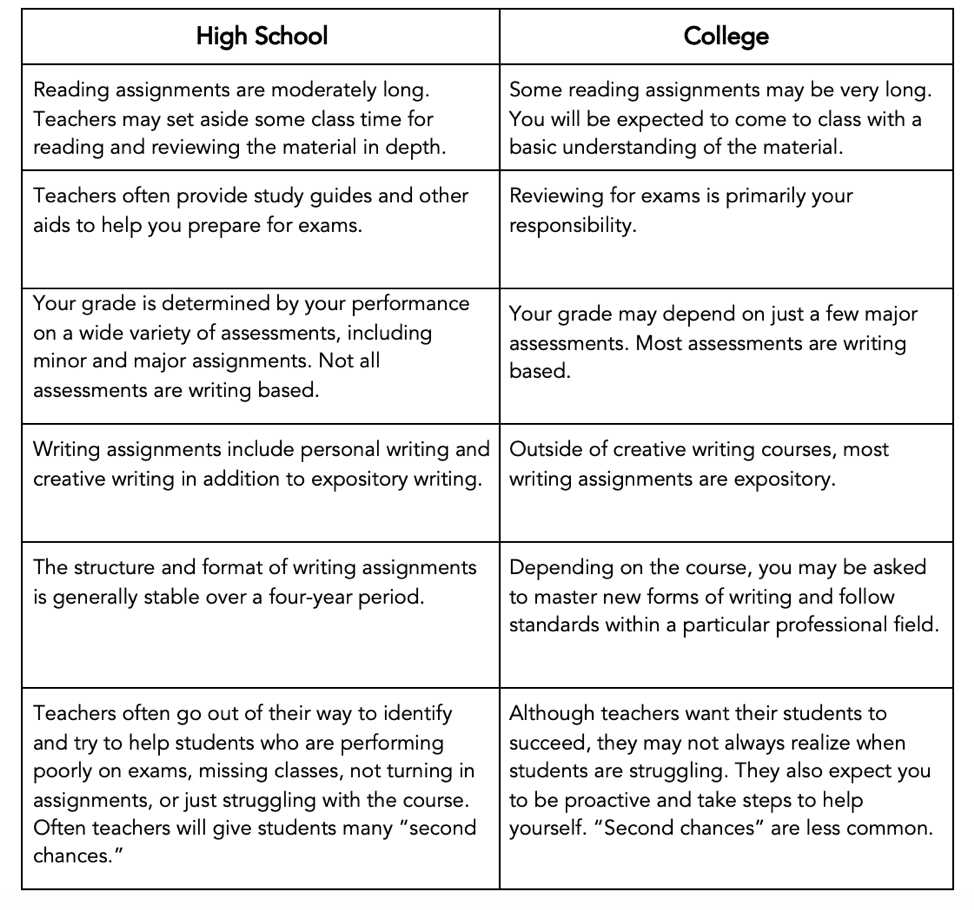As you begin this chapter, you may be wondering why you need an introduction. After all, you have been writing and reading since elementary school. You completed numerous assessments of your reading and writing skills in high school and as part of your application process for college. You may write on the job, too. Why is a college writing course even necessary?
When you are eager to get started on the coursework in your major that will prepare you for your career, getting excited about an introductory college writing course can be difficult. However, regardless of your field of study, honing your writing skills—and your reading and critical-thinking skills—gives you a more solid academic foundation.
In college, academic expectations change from what you may have experienced in high school. The quantity of work you are expected to do is increased. When instructors expect you to read pages upon pages or study hours and hours for one particular course, managing your work load can be challenging. This chapter includes strategies for studying efficiently and managing your time.
The quality of the work you do also changes. It is not enough to understand course material and summarize it on an exam. You will also be expected to seriously engage with new ideas by reflecting on them, analyzing them, critiquing them, making connections, drawing conclusions, or finding new ways of thinking about a given subject. Educationally, you are moving into deeper waters. A good introductory writing course will help you swim.
Table 1.1 High School versus College Assignments
When you are eager to get started on the coursework in your major that will prepare you for your career, getting excited about an introductory college writing course can be difficult. However, regardless of your field of study, honing your writing skills—and your reading and critical-thinking skills—gives you a more solid academic foundation.
In college, academic expectations change from what you may have experienced in high school. The quantity of work you are expected to do is increased. When instructors expect you to read pages upon pages or study hours and hours for one particular course, managing your work load can be challenging. This chapter includes strategies for studying efficiently and managing your time.
The quality of the work you do also changes. It is not enough to understand course material and summarize it on an exam. You will also be expected to seriously engage with new ideas by reflecting on them, analyzing them, critiquing them, making connections, drawing conclusions, or finding new ways of thinking about a given subject. Educationally, you are moving into deeper waters. A good introductory writing course will help you swim.
Table 1.1 High School versus College Assignments
This chapter covers the types of reading and writing assignments you will encounter as a college student. You will also learn a variety of strategies for mastering these new challenges—and becoming a more confident student and writer.
Throughout this chapter, you will follow a first-year student named Crystal. After several years of working as a saleswoman in a department store, Crystal has decided to pursue a degree in elementary education and become a teacher. She is continuing to work part-time, and occasionally she finds it challenging to balance the demands of work, school, and caring for her four-year-old son. As you read about Crystal, think about how you can use her experience to get the most out of your own college experience.
Throughout this chapter, you will follow a first-year student named Crystal. After several years of working as a saleswoman in a department store, Crystal has decided to pursue a degree in elementary education and become a teacher. She is continuing to work part-time, and occasionally she finds it challenging to balance the demands of work, school, and caring for her four-year-old son. As you read about Crystal, think about how you can use her experience to get the most out of your own college experience.


